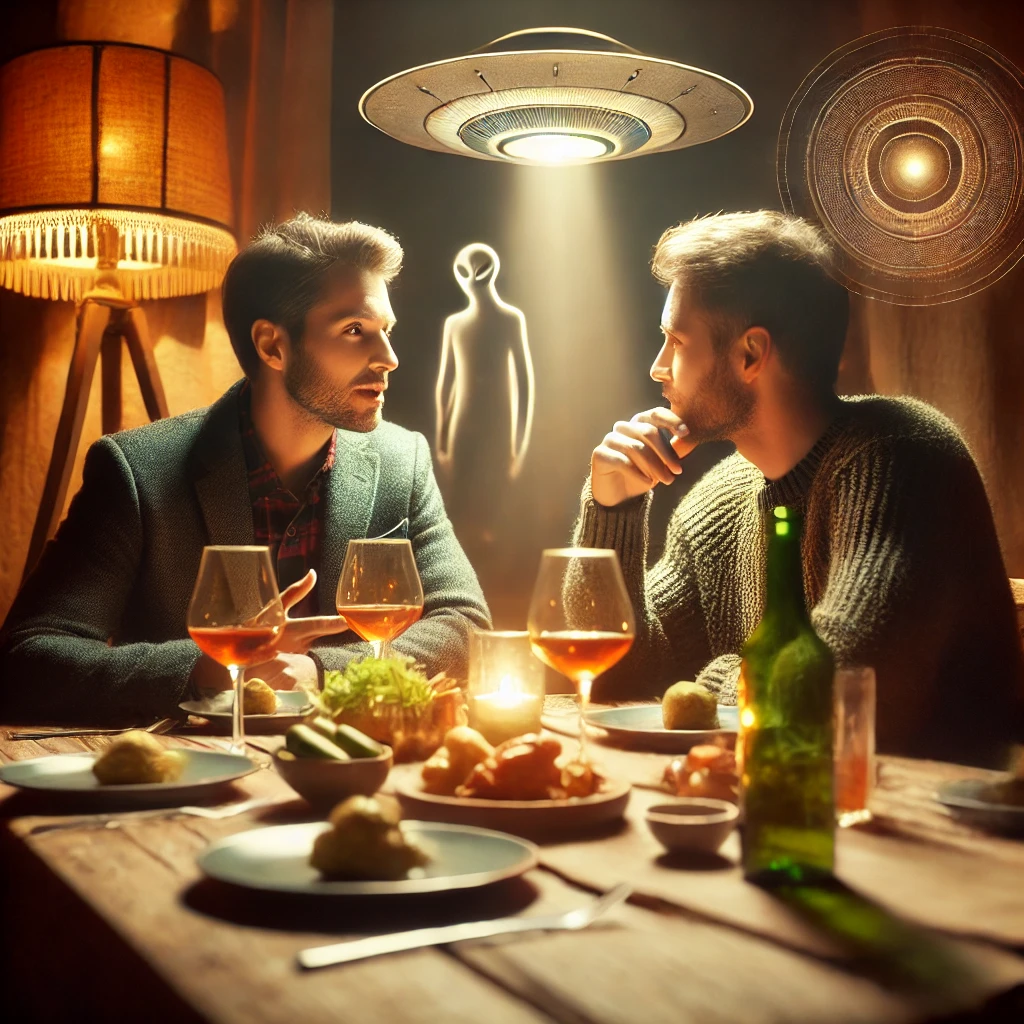My Dinner with Andre

The dialogue between Wally and Andre serves as a powerful lens through which we can examine our current reality, highlighting the uncomfortable truths we often choose to ignore. As they navigate the complexities of modern existence, they confront the notion that boredom and disengagement are symptoms of a deeper malaise—a societal conditioning that numbs our senses and dulls our perceptions. This brainwashing, orchestrated by a world driven by consumerism and conformity, mirrors the broader challenges we face in accepting the existence of non-human intelligences (NHI) and the reality of our universe.
Just as Andre and Wally grapple with the dissonance between their lived experiences and the superficial narratives perpetuated by society, we too must come to terms with the overwhelming evidence that NHIs are real. Acknowledging this truth requires us to shatter the comforting illusions we cling to, forcing us to confront the reality that our understanding of existence is far more complex than we have been led to believe. In doing so, we open ourselves to a new realm of possibilities—one that challenges our perceptions and expands our consciousness.
In this dialogue, Wally raises a concern about the state of contemporary society, suggesting that boredom might be the result of laziness or a lack of engagement. Andre responds with a more profound observation, proposing that this boredom is a manifestation of a self-perpetuating, unconscious brainwashing orchestrated by a totalitarian regime driven by money.
He emphasizes the dangers of this phenomenon, arguing that those who are bored are essentially “asleep” and therefore incapable of resisting control. Andre shares encounters with individuals who have distanced themselves from mainstream media, citing a Swedish physicist who believes we are living in an Orwellian nightmare that transforms people into robotic beings. He recounts a conversation with an elderly tree expert, who likens New York to a concentration camp built by its inhabitants, who take pride in their self-imposed confinement.
This metaphor highlights a troubling sense of complicity among individuals who fail to recognize their circumstances. The expert warns Andre to “escape before it’s too late,” which reflects a growing sense of urgency felt by many. Andre and his partner, Chiquita, also sense a pressing need to leave their current situation, akin to the desperate need to escape oppression in the 1930s. Ultimately, Andre expresses a bleak outlook on the future, suggesting that the vibrant humanity of the past may soon fade, leaving behind only automatons devoid of emotion or memory. This commentary serves as a critique of societal complacency and the potential erasure of genuine human experience.
In the movie, a playwright named Wallace Shawn shares the complexities of his life, touching on the struggles of being an artist and the challenges of making a living. As he juggles writing and acting, he describes mundane tasks like visiting the post office and dealing with bills, contrasting his earlier privileged life with his current financial anxieties. The narrative highlights his feelings of disappointment as he reflects on how, at 36, his primary focus has shifted from art to money.
His evening takes a significant turn when he reluctantly agrees to meet an old friend, Andre Gregory, a renowned theater director who has mysteriously withdrawn from the theater world. Shawn’s anxiety about the dinner stems from Andre’s strange disappearance from the stage and the peculiar tales he has heard about him, which indicate a deep existential crisis.
As they meet, the conversation meanders through various topics, including their shared history in theater and Andre’s recent spiritual journey, where he recounts an impactful experience in Poland. He describes working with a group of actors and musicians in a forest, emphasizing the liberation of expression in the absence of language. This transformative experience leads to discussions about creativity, personal growth, and the essence of being alive.
The two friends look into deeper philosophical questions about life, art, and the purpose of existence. Andre speaks about the need to strip away societal norms to reconnect with one’s true self, while Shawn expresses his skepticism about the effectiveness of such drastic measures. The conversation fluctuates between profound insights and moments of levity, reflecting their shared journey through the world of theater.
As the evening unfolds, both men confront their fears of isolation and the meaning of genuine human connection. The film captures their struggle to articulate their thoughts, ultimately revealing the longing for authenticity in a world that often feels superficial. By the end of the dinner, Shawn is left contemplating the weight of their discussion, recognizing the significance of their friendship and the memories tied to the city around him.
Returning home, he shares the experience with his girlfriend, Debbie, illustrating the impact of their conversation on his outlook on life. The film concludes with an exploration of the interconnectedness of past experiences and memories, prompting viewers to reflect on their own lives and relationships in the context of the broader human experience.
Ultimately, this exploration invites us to engage more deeply with our own lives, to awaken from our collective slumber, and to embrace the uncertainties that lie ahead. Accepting the existence of NHIs is not just a leap into the unknown; it is a call to reclaim our humanity and reconnect with the vibrant, messy, and authentic experiences that define our existence. As we navigate this uncharted territory, may we find the courage to question, to seek, and to truly awaken to the reality that surrounds us.


